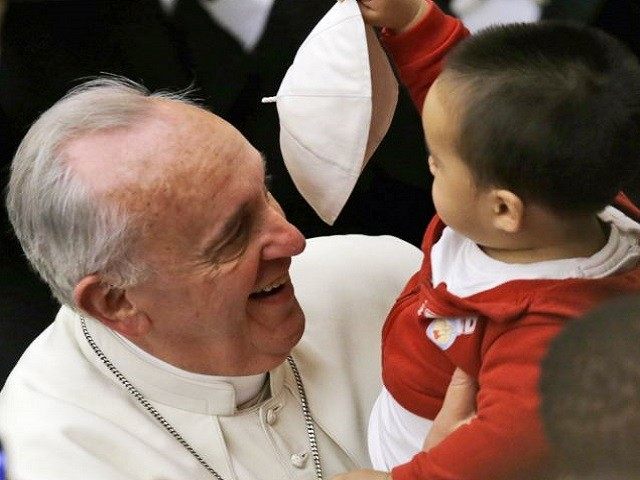Pope Francis returned to the topic of the West’s ageing population Wednesday, insisting that when the birthrate of a society barely makes it to one percent, “we can say that this society is sad and gray because it is left without children.”
In his weekly General Audience Wednesday, the Pope continued his ongoing cycle of talks on the family, this time addressing the topic of children and their importance for families and for society itself.
“Children bring life, joy, hope, and even trouble,” the Pope said. “Certainly they also bring concerns and sometimes many problems, but better a society with these concerns and problems, than a society that is sad and gray because it is left without children!”
Francis also took advantage of the subject of children to once again denounce the sin of abortion. “Children are a great gift for humanity,” he said, but they are also a great excluded class who often “aren’t even allowed to be born.”
In fact, Francis said, “A society can be judged by the way it treats children.” This judgment is not only moral, but also sociological, the Pope added, because it tells us “whether the society is free or enslaved to international interests.”
The Pope took time to ponder what he considers to be some of the blessings that children bring to a home and to a society. A first benefit, Francis said, is that children remind us all that in the early years of life, “we were totally dependent on the care and kindness of others,” noting that Jesus, too, chose to experience this vulnerability.
Children are “a treasure for humanity,” Francis said, “because they constantly remind us of the necessary condition for entering the kingdom of God: not to consider oneself self-sufficient, but in need of assistance, love, and forgiveness.” All of us, the Pope insisted, “are in need of assistance, love, and forgiveness!”
The Pope also noted how naturally children relate to God, something that often becomes harder with time. It is curious, he said, that “God has no difficulty making himself understood by children, and children have no trouble understanding God. It’s no coincidence that in the Gospel we find some very beautiful and strong words of Jesus on the ‘little ones.’ This term ‘little ones’ means all the people who depend on the help of others, and especially children,” he said.
Another gift children bring, Francis said, is that “they remind us that we are always children.” Even if one becomes an adult, or an elderly person, or a parent, or occupies a position of responsibility, “beneath all this is the identity of the child. We are all children,” he said.
None of us, he said, “gave ourselves life; we have received it. The great gift of life is the first gift we have received.”
It is easy to forget about this, he continued, “as if we were the masters of our existence, but in reality we are radically dependent.”
Children also offer a unique way of seeing reality, “with a gaze that is trusting and pure,” Francis said. “A child has spontaneous confidence in Dad and Mom, a spontaneous trust in God, in Jesus, in the Virgin Mary.”
“At the same time, a child’s inner eye is pure, not yet tainted by malice, or duplicity, or the ‘residue’ of life that hardens the heart,” he said.
“But children are not diplomats,” Francis also noted. “They say what they feel, they say what they see, without filters. And many times they are a challenge to parents, saying in front of other people: ‘I don’t like this. It’s ugly.’ But children call it like it is, they are not duplicitous, they have not yet learned the science of duplicity that we adults unfortunately have learned,” he added.
The Pope highlighted children’s innate ability to give and receive tenderness and affection. They have, in biblical terms, a heart of “flesh,” rather than a heart of “stone,” he said. This tenderness gives children the ability to “feel” things and events “and not just treat them as objects to be exploited because they are useful.”
We adults, Francis lamented, often lose the ability to laugh and cry, which is second nature to children. “So many times our smile becomes cardboard, lifeless, dull, or even artificial, like the smile of a clown,” he said.
Children, on the other hand, smile and cry spontaneously, he asserted. “Some of them smile when I approach to give them a hug,” he said. “Others see me dressed in white and think I’m a doctor coming to give them a shot, and they cry. It’s natural!” he said.
And all of this depends on the heart, the Pope continued. “Often our heart freezes and loses its ability to smile and to cry. Children can teach us to smile and cry again. But we need to ask ourselves: ‘Do I smile spontaneously, with freshness and love, or is my smile artificial? Do I still cry, or have I lost the ability to cry?’”
For all these reasons, Francis concluded, Jesus invites his disciples to “become like children” because “to such as these belongs the kingdom of God.”
Follow Thomas D. Williams on Twitter @tdwilliamsrome.

COMMENTS
Please let us know if you're having issues with commenting.